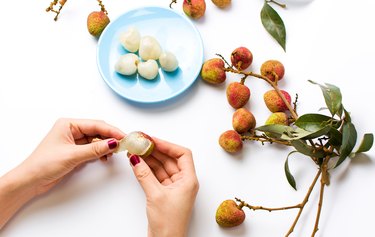
Summer may be over, but that doesn't mean it's time to ditch fruits. In addition to providing essential vitamins, fruits are a great, low-calorie alternative to sugary snacks.
Even with something as healthy as fruit, however, portion control is still important.
Video of the Day
Video of the Day
"You have to listen to your body's hunger and satiety signals before diving in for the second handful — even when it comes to fruits," dietitian Rebecca Guterman, RD, tells LIVESTRONG.com.
"But the natural fiber in fruit will keep you full longer than other more processed or refined snacks."
Are You Eating Too Much Sugar?
When choosing fruit, Guterman says that "the more colorful, the better," and variety is key. Here are the best low-calorie fruits to add to your diet.
1. Strawberries
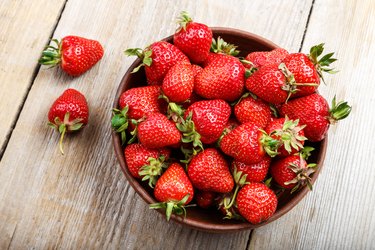
49 calories per cup, halved
While they're delicious on their own, strawberries are also great in breakfast cereals and parfaits. If you coat them in yogurt, kefir or sour cream, they make for a great low-calorie and healthy dessert option as well.
Additionally, they're "a great source of vitamin C to ward off colds that often accompany the change in weather," Guterman says.
Tip
Look for the dark red strawberries, as those are usually the sweetest.
2. Kiwi
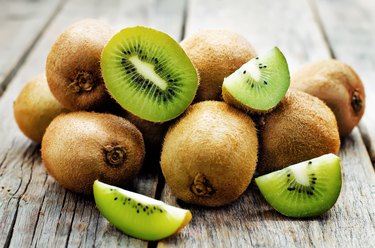
42 calories per one fruit
This tangy fruit is best to eat by cutting in half and scooping out the flesh. However, while most people prefer peeling away the fuzzy brown skin, Guterman says that it's safe to eat.
"Plus, it makes the kiwi an even quicker, portable snack." Kiwi also contains some fiber, which is good for keeping us fuller for longer.
3. Oranges

45 calories per one small fruit
No surprise here: Oranges are a great source of vitamin C, which can help boost your immune system and heart health.
But Guterman recommends skipping the OJ and eating oranges instead to avoid concentrating all of the natural sugars and losing out on the belly-filling fiber.
4. Clementines
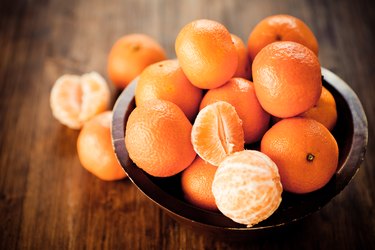
35 calories per fruit
Just one clementine packs 40 percent of your daily recommended amount of vitamin C.
Guterman recommends "slicing them thin and adding them to sandwiches or salads for a new burst of flavor to change up your usual routine."
5. Blackberries
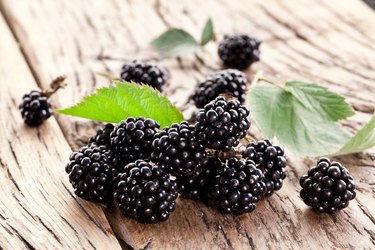
41 calories per 2/3 cup
According to Guterman, these tiny berries are "little nutrition powerhouses."
They're high in antioxidants, fiber and vitamin K — a fat-soluble vitamin that's crucial for blood clotting and beneficial for bone health, per an October 2015 report in Open Heart.
Tip
Add blackberries to your overnight oats for a pop of flavor and to stay full all morning long.
6. Lychee
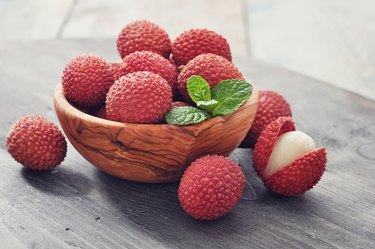
20 calories per fruit
These tropical, red-skinned fruits are native to China and often overlooked. If you can find them, grab a bag because lychees are rich in vitamin C, antioxidants and dietary fiber.
Unlike many other fruits, the leathery skin of lychees is inedible. But once you peel it away, you can enjoy the burst of flavor that comes with this highly portable fruit.
7. Pomegranate
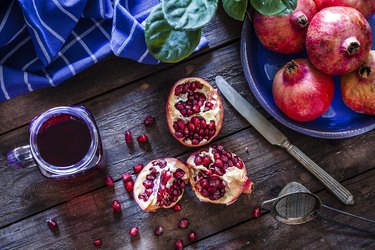
43 calories per 1/3 cup
"Sweet and tart, these antioxidant powerhouses are a great snack," Guterman says. "And if you eat them individually, the slow pace of your snacking will leave you feeling satisfied with this natural treat."
Pomegranate seeds get their deep, red color from polyphenols, which are powerful antioxidants.
8. Cherries
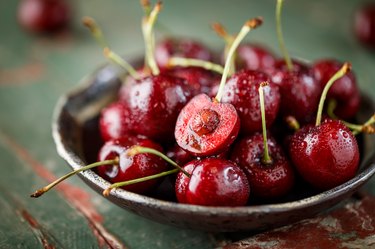
48 calories per 1/2 cup
"Having to eat around the center pit will slow you down when sitting to snack on cherries," Guterman says. "This makes your snack last longer, leaving your body time to listen to its hunger and satiety cues."
Plus, cherries are linked to a reduced risk of inflammatory diseases including, arthritis, cardiovascular disease, diabetes and cancer, per a March 2018 review in Nutrients.
9. Pineapple
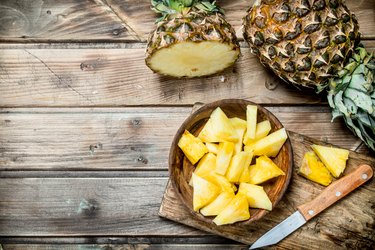
41 calories per 1/2 cup
"Slightly higher in natural sugars than other fruits, this makes pineapple the perfect swap for higher-calorie and fat-containing desserts," Guterman says.
In addition to feeling like an actual treat, pineapples are a rich source of vitamin C and dietary fiber. And since they're up to 86 percent water, they'll also keep you hydrated.